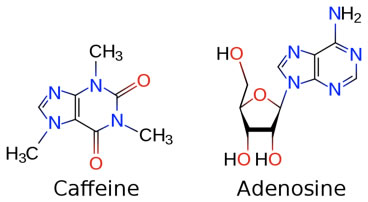Some upperclass chemistry students at the University of Delaware put together a nice site that summarized the effects of caffeine (http://udel.edu/~danikoll/index.html), but it has been removed. (A snapshot is available in Wayback Machine.)
Particularly relevant was their description of metabolism of caffeine:
Caffeine is absorbed in the small intestine, metabolized in the liver cell and distributed to body tissues within 45 minutes of ingestion.
It has a half-life of 3-5 hours in adults but can have a half-life of up to 80 hours in pregnant women prior to delivery.
A technical term in the literature is "oral clearance", meaning the rate at which a drug administered orally is removed from the body, the three elimination pathways being renal, hepatic, and pneumatic. As the references in the above link document, caffeine is eliminated primarily by the liver breaking it down into paraxanthine (84%), theobromine (12%), and theophylline (4%). While these last two compounds have some CNS effects, it is believed that largely caffeine itself acts by competing with adenosine for adenosine receptors.

The simplest way to extend a caffeine buzz (setting aside pregnancy as impractical for most) is to consume more caffeine. [A more difficult challenge might be finding a way to shorten the duration of a coffee buzz.]
A 1985 study by Abernethy and Todd, "Impairment of caffeine clearance by chronic use of low-dose oestrogen-containing oral contraceptives", demonstrated that the half-life of caffeine is extended by progesterone administration.
You say that you wish to consume as little coffee as possible, so perhaps the same amount of coffee (espresso, once every other day) could be taken in divided doses. This then converts the problem into how to create an equally intense buzz with (say) only half the caffeine.
I've noticed is that a sharp reduction in carbohydrates leads (after a couple of weeks, with mild ketosis) to a stronger physiological response to caffeine.
I can only offer this as an anecdotal observation. There is research on the interaction of caffeine and glucose on cognitive processing and on the effects of caffeine consumption on glucose homeostasis. But neither topic is precisely like what I'm suggesting.
